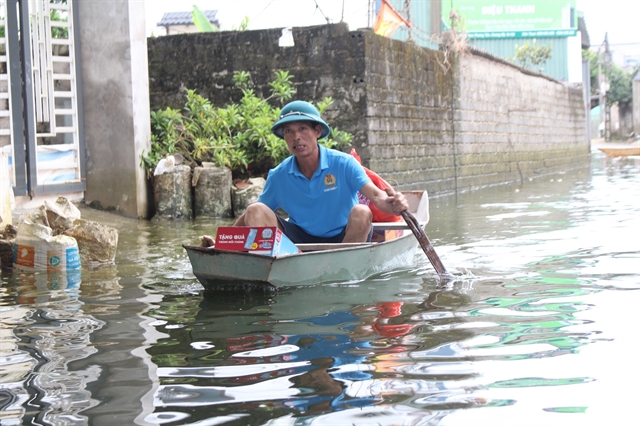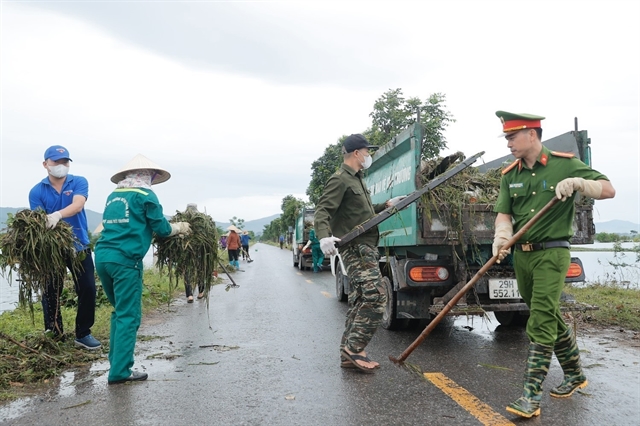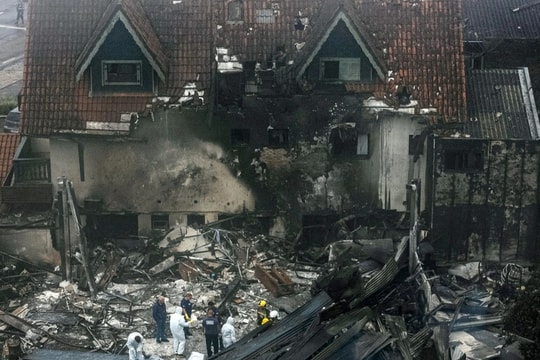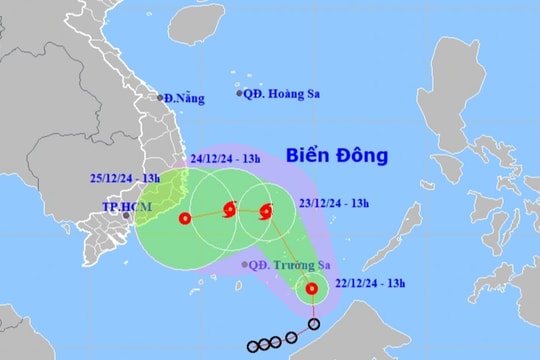 |
| A local resident still has to travel by boat in Nam Phương Tiến Commune, Chương Mỹ District, Hà Nội on Thursday. —VNA/VNS Photo Nguyễn Cúc |
HÀ NỘI — The Hà Nội Steering Committee for Disaster Prevention and Search and Rescue has directed district, town authorities as well as relevant agencies to intensify efforts to address the aftermath of flooding, triggered by typhoon Prapiroon and proactively prepare for future floods and landslides.
Under the dispatch, local authorities and agencies must remain vigilant and avoid complacency.
They were instructed to closely monitor weather and disaster developments, issue timely and effective responses within their authority and ensure actions aligned with the actual conditions on the ground.
The directive was outlined in Dispatch No. 04/CĐ-BCH, which focuses on measures to minimise human casualties and proactively handle upcoming flood and landslide situations.
Additionally, there should be increased public awareness campaigns and guidance on dealing with heavy rainfall, floods, landslides and waterlogging through various information systems and social media.
Localities and sectors were also urged to review and bolster personnel for traffic management and safety at crossing points, landslide-prone areas and regions affected by severe flooding. They must prevent people and vehicles from passing through unsafe areas.
Authorities had to prepare resources and personnel for rescue operations if needed and ensure strict monitoring and timely reporting of disaster developments, damage and response efforts to the steering committee as per regulations.
Due to the impact of the typhoon and extreme weather phenomena, the city has experienced difficult flooding and landslides.
Water levels in major reservoirs and local rivers are currently hitting dangerously high levels.
Recent severe flooding in several communes in Chương Mỹ and Quốc Oai districts has caused significant damage to thousands of households in the areas, with an increased risk of disease outbreaks.
Disease prevention
In a related move, the city’s Health Department has instructed relevant units to enhance medical responses during and after the floods and to prevent disease outbreaks among the population.
Deputy director of the health department Nguyễn Đình Hưng said that the department ordered hospitals and health centres to set up emergency teams and mobile disease prevention units, ensuring an adequate supply of medicines for treating flood-affected residents.
 |
| People participate in environmental sanitation in post-flooded areas in Tuyết Nghĩa Commune, Quốc Oai District, Hà Nội on Thursday.—VNA/VNS Photo Minh Quyết |
In areas completely isolated by floodwaters, mobile emergency teams would visit households to provide immediate assistance and transport residents to hospitals as needed.
The city’s Centre for Disease Control has established five mobile disease prevention teams to guide local health centres and coordinate with authorities to prepare Cloramin B for environmental sanitation as floodwaters recede.
The city’s Food Safety and Hygiene Division has formed five teams to handle food poisoning and foodborne diseases, ready to respond to any outbreaks in flood-affected areas.
In Chương Mỹ District, the city’s flood hotspot, mobile health stations have been set up in Nam Phương Tiến Commune, with four emergency teams permanently stationed to handle emergencies, disease prevention and respond to storms and flooding.
The district’s health centre instructed 32 health stations to proactively manage environmental conditions before, during, and after the floods.
They were also preparing medicines for common post-flood ailments such as conjunctivitis, acute diarrhoea, and various skin conditions.
Đỗ Hoàng Anh Châu, Vice Chairman of Chương Mỹ District People’s Committee, has requested that all departments and local authorities strengthen disease prevention efforts during the rainy season.
The district’s Health Centre was told to assess and address disease risks in flood-affected areas and implement measures for disease prevention, environmental sanitation, clean water management and medical waste disposal.
To tackle environmental sanitation after the floodwaters recede, the health centre distributed nearly 200kg of Cloramin B to submerged communes to treat water and disinfect the environment, with additional supplies available.
Staff are on 24 hours per seven days standby with four mobile teams monitoring and assisting in affected areas.
The Health Centre was also tracking pregnant women in flooded communes and assigning medical staff to monitor their conditions and guide them to safer locations.
In Quốc Oai District, the district’s Health Centre distributed 10 g of Cloramin B to flooded communes for water and environmental treatment and instructed local health stations to increase medical services and manage patient care in affected regions.
On Thursday, the district mobilised approximately 300 people to conduct a comprehensive environmental clean-up in all affected communes.
Nguyễn Trường Sơn, Chairman of the People’s Committee of the district said on Thursday that post-flood environmental pollution was the most pressing concern.
Authorities must urgently mitigate the environmental impact of the disaster, ensuring sanitation efforts keep pace with receding waters and providing adequate manpower, medicines, chemicals and equipment for decontamination.
Public awareness campaigns should also encourage residents to maintain environmental hygiene and prevent disease outbreaks following the floods.— VNS






















